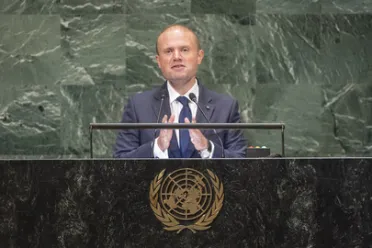Statement
Statement summary
JOSEPH MUSCAT, Prime Minister of Malta, said that to find solutions the international community must be committed to communicating and understanding one another. The trend of nations drifting towards reactions confined to their own borders is of concern. Some are looking at solving global issues with local solutions, which can give the illusion of working for a limited time or can lead to almost immediate implosion. While the sovereignty of all nations must be respected, those who are closing themselves off to debate falsely believe they will escape certain issues, he cautioned.
There are divisions not just among global leaders and nations, but within countries’ own societies, neighbourhoods and even families, he said. Local solutions breed global problems that can manifest themselves with devastating results, from the use of plastic products that are polluting the seas to mass migration and the effect of displacement on both migrants and host nations. Malta has been hit particularly hard by those issues and has been grappling for years with all the complexities that such challenges pose.
However, with a unified approach, criminal gangs profiting from smuggling human beings can be stopped, he emphasized. A global strategy can deliver incisive blows to migrant smugglers; their online recruitment efforts and their payment methods can be disrupted. Most importantly, they can be stopped from profiting from a practice that often results in the death of innocent people. Malta’s humanitarian response continues to fully adhere to its international commitments.
He went on to say that, in recent weeks, because of the actions of a few who did not abide by the relevant conventions, Malta had to bring together like‑minded nations with humanitarian consciences to offer a place of safety to stranded migrants. Although this was just a temporary respite from a much bigger problem, actions like these can provide the foundations for a longer‑term solution if all European Union member States come together. The Global Compact on Safe, Regular and Orderly Migration is a welcome move in the right direction, but it is a milestone, not the end of the road.
Although fewer people live in extreme poverty, it has not been eradicated, he noted. Solutions have been found for many life‑threatening diseases, yet cures are still needed for others. Injustice remains, and climate change could be the biggest threat to life in history. By harnessing new technologies, which pose endless possibilities, the world can move forward. However, while these are exciting technological times, there are also challenges in this fast transition to the digital economy. Such challenges have to do with the nature of concepts that were previously thought to be unchanging, such as the nature of work. Whether for technology or immigration, solutions do not come through closed doors. The digital economy needs to be seen as an opportunity, he said.
Full statement
Read the full statement, in PDF format.
Photo

Previous sessions
Access the statements from previous sessions.
